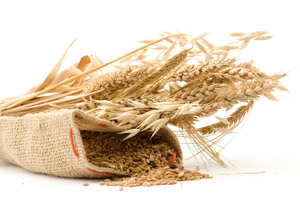 Fiber is important in your diet for a number of reasons, the main ones being that it improves digestion and lowers your risk of contracting diabetes, cancer and heart disease. It is recommended that adults get from 25 to 30 grams of fiber in their diet every day.
Fiber is important in your diet for a number of reasons, the main ones being that it improves digestion and lowers your risk of contracting diabetes, cancer and heart disease. It is recommended that adults get from 25 to 30 grams of fiber in their diet every day.
There are two types of dietary fiber: soluble and insoluble. Soluble fiber dissolves in water (and digestive juices), forming a gel-like substance that helps to lower cholesterol levels and reduce high blood sugar, while insoluble fiber is an indigestible bulking agent that keeps things moving in the digestive tract, aiding in elimination, and reducing occurrences of constipation, hemorrhoids and diverticulosis.
Soluble fiber can be found such foods as oats, apples, pears, lentils and carrots, while insoluble fiber is typically found in whole grain flour, nuts, broccoli, seeds and wheat bran. Beans may be one of the best sources, as they contain both soluble and insoluble fiber.
Fiber has been found to:
- Lower blood cholesterol – Studies have found that soluble fiber lowers low-density lipoprotein (LDL), or the “bad” cholesterol in the blood, which can reduce your risk of coronary heart disease. The fiber binds to bile acids, allowing for the elimination of cholesterol from the system.
- Control blood sugar levels – Fiber slows the rate at which sugar is absorbed into the bloodstream after a meal, helping to avoid insulin spikes and keeping your blood sugar at moderate levels, also reducing your risk of diabetes.
- Help you lose weight – The more fiber a food has, the more likely you are to feel full after eating and not become hungry as quickly. High-fiber foods are also usually lower in calories, so eating the same volume of high-fiber food will provide you with fewer calories to burn than its low-fiber counterpart.
- Maintain bowel health – Because fiber absorbs water it increases bulk and softens the stool, making elimination easier, and reducing hemorrhoids. Studies have also shown that it can also help relieve irritable bowel syndrome.
Try to avoid eating processed foods, as these are usually quite low in fiber. Your best choice is to eat whole foods such as fresh vegetables and whole grains, which will provide you with a high-fiber diet.
It’s easy to incorporate high-fiber foods into your diet. Oatmeal at breakfast (preferably the steel cut variety, which has considerably more fiber than the instant kind) with a little fresh fruit added makes a great high-fiber start to your day. If you get hungry at work, instead of heading for the candy machine, try bringing some dried fruit or a handful of nuts. You can also add beans or chopped vegetables to soups and stews for extra taste and fiber. Your body will thank you!














